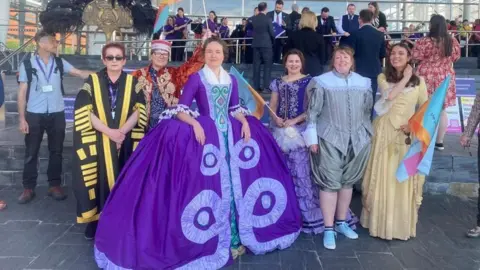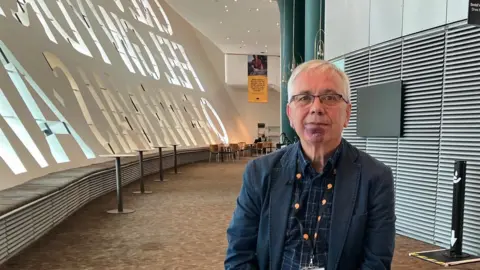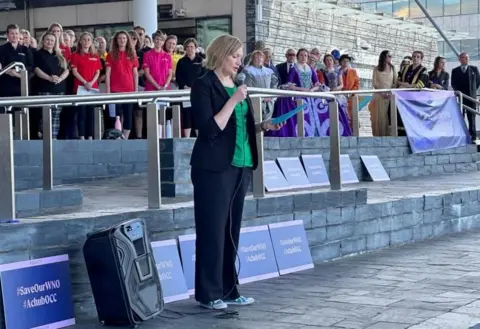Professional Welsh arts could disappear - claim
 BBC
BBCIf funding cuts to the arts industry continue “there will be no professional sector in 10 years”, the chief executive of Arts Council Wales has warned.
Dafydd Rhys is calling for statutory funding for the sector from the Welsh government.
It comes as the council publishes a report into the economic impact of the arts in Wales which reveals that for every pound spent there is a return of £2.51.
The Welsh government said it is "determined" current financial challenges will not restrict its "long-term ambitions for the sector".
Arts Council Wales has received a 40% cut in funding in real terms since 2010 and Mr Rhys says he has grave concerns the sector will not exist in a decade.
He also warned the arts are at risk of becoming elitist if not properly funded.
“I doubt very much of it will be there in 10 years' time, other than it might be in the hands of some very, very rich benefactors, and won't be available for everybody at an affordable price,” he added.
The report has been published, Mr Rhys said, “as an advocacy tool” to fight for the sector and its funding.
In December, the Welsh government will publish its draft budget.
“The turnover of the sector and the creative industries and culture is something like £1.6bn," Mr Rhys added.
"The employment is in the region of 40,000, which is similar to things like insurance or the financial sector, it’s similar to telecoms.
"This is a serious professional sector and it needs to be supported because it cannot go on as it’s been.”

Mr Rhys also believes the arts should receive statutory funding status from the Welsh government.
“Because the arts are not a statutory responsibility, it is somewhere that local authorities can go to look for savings," he said.
"I think that the Welsh government should consider ringfencing that funding.
"It puts a responsibility on the local authorities that they cannot go there as a first place of call to make the cut."
In June, research commissioned by performing arts union Equity revealed that in real terms, overall arts funding in Wales had dropped by 30% since 2017.
This is compared to a drop of 11% in England, 16% in Northern Ireland, and an increase by 2% in Scotland.
 Elizabeth Atherton
Elizabeth AthertonIn May an open letter was signed by 175 artists including Sir Bryn Terfel, Katherine Jenkins, Michael Sheen and Ruth Jones calling for emergency funding for Welsh National Opera, after it received a funding cut of 35% from Arts Council England and 11.8% from Arts Council Wales.
Elizabeth Atherton, an opera singer, said she had “no confidence” that the Welsh or UK governments were taking the matter seriously enough and said morale within the sector was "at an all-time low".
“With careers collapsing and organisations struggling to keep afloat, artists are increasingly having to leave the industry completely, and arts organisations are diminishing their output as they fight for survival,” she said.
“Without serious investment from government we will soon have nothing left for future generations.”
Yvette Vaughan Jones, chairwoman of Welsh National Opera said “continued cuts to the arts are a significant concern".
“With further cuts, there is not only a risk to the artistic quality and talent development of our artists and arts workforce, but also a real risk to cross-sector work including in health and education which has a huge impact," she said.
A spokeswoman for performing arts network Creu Cymru welcomed the report and agrees that the 40% cut in funding since 2010 needs to be “urgently addressed”.
She said urgent action was needed to prevent closures and the “downward spiral that will cause the arts to lose their impact”.
The spokeswoman added that the challenges faced by the sector were hitting its ability to stay open, retain staff, and produce new work.
“Even a small boost in arts funding could have a major impact, creating more than a thousand new jobs across Wales,” she said.
The Welsh government said the arts sector made "a vital social, cultural and economic contribution to our society, enriching communities and inspiring future generations".
It added that the current financial challenges should not restrict its long-term ambitions for the sector.
The Welsh government recently gave £1.5m of additional funding to the arts sector via Arts Council Wales to help protect jobs.
It will announce longer-term spending decisions within its draft budget over the weeks ahead.
A UK government spokesperson said: "We are determined to ensure that arts and culture are no longer the preserve of a privileged few and are carefully considering how we fund arts organisations across the country to unlock more creative opportunities."
